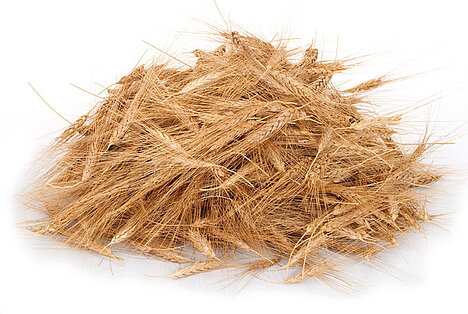Wheat starch

Wheat starch is a carbohydrate obtained from wheat. It is odorless and tasteless and is often used as a thickener or binding agent in food. But is wheat starch also suitable for dogs? In this article, you will find out what wheat starch is, what its advantages and disadvantages are and what you should look out for when feeding it to your dog.
What is wheat starch?
Wheat starch consists of over 85 percent carbohydrates. Water makes up around twelve percent. Proteins and fat are only present in minimal proportions. The starch contains around 345 kilocalories per 100 grams. Wheat starch contains hardly any vitamins and other micronutrients.
Wheat starch is made from white, thin-skinned, floury wheat. This contains around 58-64% starch, as well as around 10% gluten and 3-4% cellulose, which mainly forms the husk of the grain.
What are the benefits of wheat starch for dogs?
Wheat starch in digested form is an excellent source of energy for dogs. Wheat contains highly digestible proteins which, in combination with animal protein, provide an ideal amino acid profile for dogs. Wheat contains essential amino acids for our four-legged friends.
What are the disadvantages of wheat starch for dogs?
However, wheat starch can also have disadvantages for dogs. On the one hand, wheat starch can lead to obesity if it is fed in excessive quantities. On the other hand, wheat starch can trigger allergic reactions and sometimes severe digestive and skin problems in some dogs. Futterhaus explains why dog food should be wheat-free.
What should you look out for when feeding your dog?
If you want to feed your dog wheat starch, there are a few things you should bear in mind. Firstly, you should adjust the amount of wheat starch to your dog's energy requirements. Secondly, you should test your dog for possible intolerances or allergies. If your dog shows signs of itching, diarrhea, vomiting or a skin rash, you should stop feeding wheat starch immediately and consult a vet.
Wheat starch is a carbohydrate that can have both benefits and disadvantages for dogs. It is important to control the amount of wheat starch and check your dog for possible intolerances or allergies.
If you notice any signs of hypersensitivity or poisoning in your dog, you should see your vet immediately. We are not a substitute for a vet, but we try to be as accurate as possible. Every dog reacts differently and we recommend you get a second opinion or consult your vet if in doubt.
Stay healthy and take good care of your four-legged friend!😊